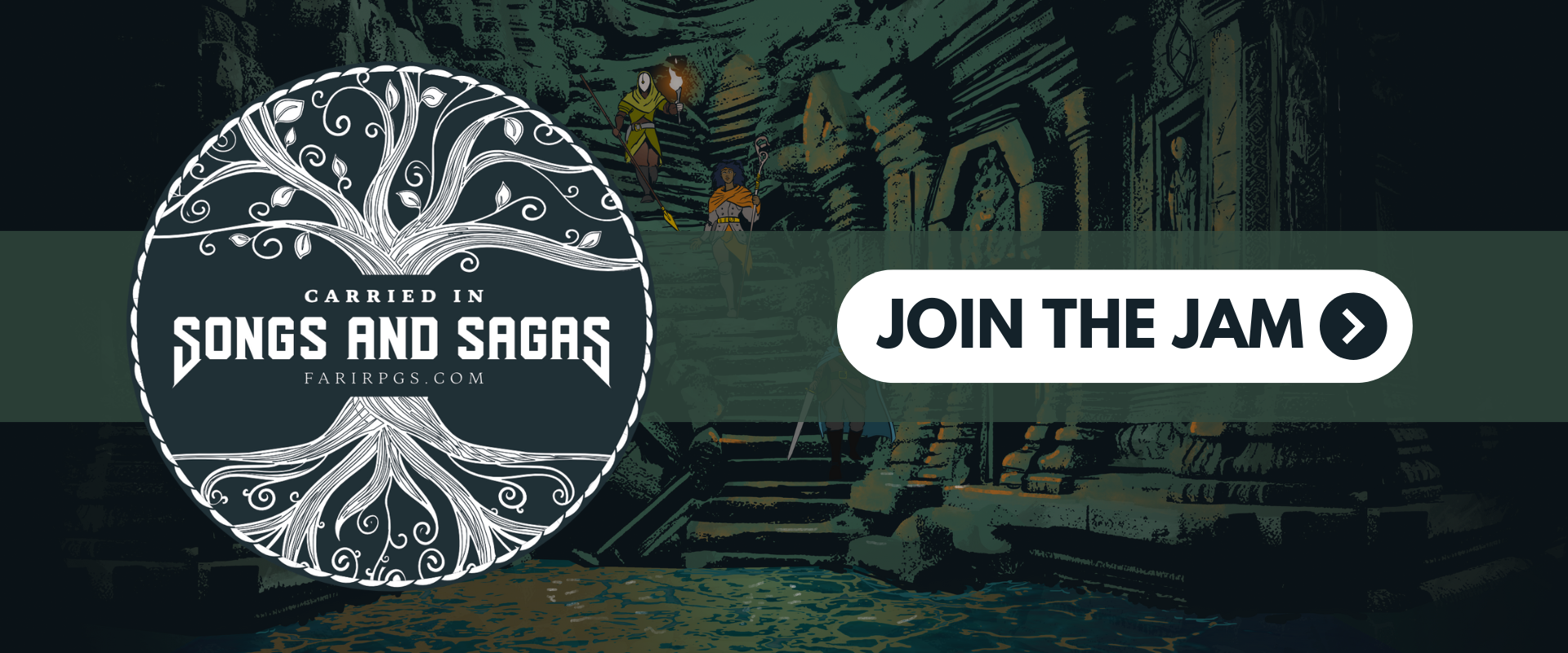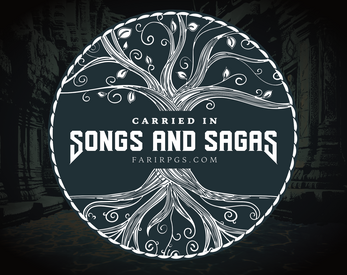
Songs and Sagas Creator Kit
A downloadable design toolkit
In here, you will find links to the online Songs and Sagas Creator Kit, which includes a System Reference Document (or SRD), design notes, license information and even logos to identify your game as a game Carried in Songs and Sagas.
Songs and Sagas is a condensed OSR inspired tabletop role-playing game of axes, runes, spirits and legends. In this game, all players work together to unveil the story of fierce warriors striving to forge a new life in the midst of an unforgiving alien wilderness.
License Attribution
The text of Songs and Sagas is available for use under the ORC license. For more information about Songs and Sagas' license, check out the official guidelines here.
In a nutshell, you may copy, paste, adapt, hack, or change anything you find in either game as long as you give proper attribution and license your work using the same license.
Resources
- TEXT AND LOGOS
- TRANSLATIONS
- SAMPLE GAMES
- Carried in Songs and Sagas Collection on itch.
- Songs and Sagas Jam submissions on itch.
- TEMPLATES
- Landscape and Portrait Templates for Publisher
- Portrait Template for Canva
- FONTS in the Affinity Publisher template are free and open licensed
- Germania one is used for the headings.
- Petrona is used for the body text.
- DISCUSSION
Songs and Sagas Game Jam
To celebrate the release of Songs and Sagas, we are also launching the Songs and Sagas Game Jam, inviting all game designers to create something using the Songs and Sagas system or design a supplement for the original game.
► Join the game jam at https://itch.io/jam/songs-and-sagas-jam
Core Principles
Songs and Sagas is based on the following principles:
Self-Directed Exploration When a player starts the game, they arrive in a location they've never been before. It is their duty, job, or only option to move forward and explore. Each new location is divided into a number of hexes, each associated with a risk rating, and filled with unique details and mysteries that yearn to be uncovered.
Balance of Tension: The game utilizes a clever combination of a deck of playing cards and traditional polyhedral dice to establish a balanced level of player control over the narrative. When a player successfully performs a risky action, they add (mostly) red cards to their hand, gradually increasing the number of black cards in the rest of the deck. Since black cards are always associated with negative outcomes, this design encourages players to strategically burn their cards by returning them to the deck to prevent the deck from becoming overwhelmed with black cards.
Narrative Control: Whether through trial rolls or fate rolls, the game's core resolution engine determines who currently holds control of the narrative and what options they have for their next move. It's not so much about clear-cut success or failure, but rather about who has the power to shape the direction of the story.
Risk-Taking: Whether in moments of success or setbacks, the game always pushes the story forward. It achieves this by providing mechanical rewards to the player in any situation. Successful actions grant players cards that can be used to activate special abilities, while setbacks allow players to earn XP, which will ultimately make them more powerful.
Familiarity with OSR: Built on simplified yet solid foundations, the mechanics will feel familiar but also take interesting twists and turns, allowing for the creation of more grand and epic stories than the traditional OSR experience.
Solo-Friendly: By incorporating oracles, tables, and player-facing actions, the system was designed with solo play in mind from the beginning. Solo players will find it accessible and enjoyable as much as groups, whether with or without a GM.
System
You can expect mechanics to support:
Exploration: Players traverse a hex-grid using rolling tables to define the features of each region, and revealing cards to determine their level of risk and danger.
Risky Action Resolution: When a player character undertakes a risky action, they must make a trial roll to maintain control of the narrative by rolling a d20 + an attribute against a set difficulty rating. The twist is that the GM reveals a number of cards equal to the current region's risk rating, with each black card increasing the difficulty of the action.
Momentum: When a character successfully completes a trial roll, they add a card to their hand. At any point in the game, they can burn a card to accomplish various actions or activate special class-based abilities.
Oracle Resolution: When a character performs an action that does not entail significant risk, but the player still wishes to delegate the decision-making process, they can make an attribute-based fate roll to leave the outcome to luck.
Inventory: Characters will fill their inventory with materials, weapons, and artifacts discovered during their journey. Each character has a set number of slots to store these items, but they may lose access to certain slots depending on their overall well-being.
Resilience and Conditions: When a character experiences a setback, they may suffer a blow to their resilience, which could eventually incapacitate or even kill them. Another way to represent a character's well-being is through conditions, which are negative aspects tied to a character. Each condition occupies one inventory slot, thereby limiting the number of items players can carry. Conditions can also be used by the GM to make a player roll with an increased difficulty rating.
Weapons and Armors: When encountering danger in the wilderness, characters may need to resort to combat or violence. They fight using their weapons, and hope their armor will protect them from incoming attacks. Both weapons and armor are associated with a die rating (d4-d12), which indicates the overall state of the item. Players use their weapons' die ratings to attack and their armor die ratings to resist incoming hits. Throughout their journey, these items may become damaged and require repair and maintenance.
Combat: Combat is swift, perilous, and lethal. Attacks always hit, but players roll to determine the impact of each hit before rolling for damage. Encounters of this nature can easily stall and result in unfavorable outcomes if the characters are ill-prepared. Therefore, players should constantly strive to gain the upper hand through creative means even before the combat starts.
Archetypes: During character creation, players choose an archetype that influences the initial attribute ratings of their character and grants them special abilities that they can use to their advantage by burning cards from their hand.
Experience: Rolls that result in setbacks should not be seen as a failure, but rather as an opportunity to learn and grow. Throughout the game, characters will face risky challenges and failing to succeed in these challenges always grants the character some experience, which will eventually allow them to become stronger.
—
Creator: René-Pier Deshaies of Fari RPGs
Illustrator: Galen Pejeau of Nightjar Games
Editor: Eric Lazure
Additional Editing: Lynn Jones
Design Consultants: Ryan Lucas, Lynn Jones, Andrew Boyd, Matteo Sciutteri
Font Attribution: Dice font from Dicier, by Speak the Sky, licensed under CC BY 4.0
| Status | Released |
| Category | Physical game |
| Rating | Rated 5.0 out of 5 stars (13 total ratings) |
| Author | Fari RPGs |
Download
Click download now to get access to the following files:

Comments
Log in with itch.io to leave a comment.
So how do you download the kit? I purchased a copy, but nothing is downloading...
The kit is actually all available on this website here: https://farirpgs.com/songs-and-sagas/creator-kit
We chose to use a website instead of a PDF to make it more accessible, enable people to search the entire content, and also to allow for quick edits.
If you have any other questions don't hesitate!